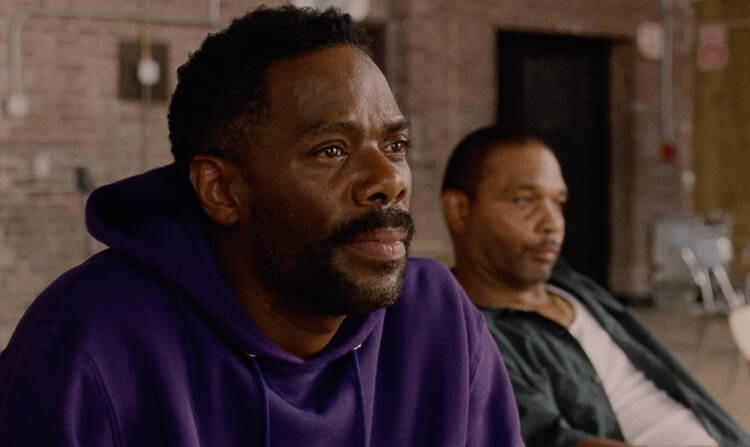Divine Eye doesn’t want to be here. Slumped against a pole in the prison theater and hoping he might disappear, he watches a group of grown men—all residents of the maximum-security Sing Sing Correctional Facility on the Hudson River north of New York City—prepare for an upcoming play. In rehearsals, they shout and laugh and fall about the room, trying out voices, experimenting with props. Suspicion and disdain crawl across his face.
“Grow up,” he thinks. “Don’t they know we’re in prison?”
In the year’s most astounding breakout performance, Clarence “Divine Eye” Maclin plays himself in “Sing Sing,” a mature, Oscar-ready feature from director Greg Kwedar chronicling a group of incarcerated men who banded together as an acting troupe. At first resistant to the prison’s Rehabilitation Through the Arts program, Divine Eye undergoes a kind of conversion process to become one of the group’s finest thespians (he portrays Prince Hamlet in one performance in the film) and most visible promoters.
A hit at last year’s Toronto Film Festival, “Sing Sing” centers the often-rocky relationship between Divine Eye and John “Divine G” Whitfield, the charismatic group leader played with warmth and heartache by Oscar nominee Colman Domingo, as their humdrum lives are transformed and their common humanity is renewed by community. Mr. Whitfield, a playwright who studied at New York’s former High School for the Performing Arts and has since been released from Sing Sing, recalled the early years of the R.T.A. program that he helped establish.
“It really started out as just a bunch of guys who just wanted to do a play,” he said in an interview with America. From there, Mr. Whitfield added, the men staged several performances that won the approval of its viewers—including the guards. “It was having a positive impact on the prison population. At that moment, we decided we needed to turn this into a program because it had such huge power to change people’s behavior. Every human being has the power to change.”
Theater, he said, was the key to avoiding “bitterness” after years of imprisonment. And over time, he saw R.T.A. foster friendships, encourage interaction between diverse groups, and in some cases, change minds. Such was the case for Divine Eye, whom Mr. Whitfield said was “still carrying knives” when he reluctantly joined the program. But the experience had a disarming effect. “It was hard for some individuals to embrace [others],” Mr. Whitfield said. “As they went through the process, they would begin to say, ‘Oh, it’s not as hard as I thought it would be.’”
Since its inception in 1996, R.T.A. has expanded into eight prisons throughout New York State and created visual art, modern dance, writing and music programs for incarcerated persons. Its champions claim that R.T.A. has a marked impact on decreasing recidivism rates in the United States, where two out of three people released from prison are rearrested within three years, per 2008 data from the Bureau of Justice Statistics. According to its website, R.T.A. reduces recidivism rates to less than 3 percent for its participants.
Still, the United States experiences some of the highest incarceration and recidivism rates in the world. While the national prison population declined slightly between 2010 and 2020, it increased again throughout most states in 2022. More than 1.2 million people were incarcerated in the United States by that year.
When asked about casting former R.T.A. participants in his film, Mr. Kwedar noted that while the men did not have prior film credits, they had extensive experience on stage, even if nonprofessionally. “The talent was undeniable in this program,” he said in an interview with America. “A lot of what they didn’t know [about screen acting] became an access point to do something really pure and unguarded.”
Mr. Kwedar characterized the support of R.T.A., and in particular the vision of Whitfield and Maclin, as essential to the production. Casting was made difficult not by program members’ lack of ability, but by their abundance of talent. And it was Maclin who made an immediate impression. “When he walked through the door, I knew he was a star,” said Kwedar, who first met Mr. Maclin eight years ago. The director was struck both by his personal magnetism and gravitas, characteristics that became more visible as the cameras rolled.
“Sing Sing” does well to sidestep the trap of cheap melodrama that exploits the trials and traumas of incarcerated people. There are no stereotypical cut-outs here, no scenes of shocking violence perpetrated by a vindictive warden or the token “prison gang.” (Although at least one advocacy group believes the film didn’t go far enough in depicting the brutality at Sing Sing.)
Rejecting sensationalism required a deliberate choice, Mr. Kwedar explained, to focus on the program itself—and its capacity for good. “The radical thing is what’s happening inside this space, inside these rooms, where this work is coming [from],” he said. “That feels like a discovery.”








